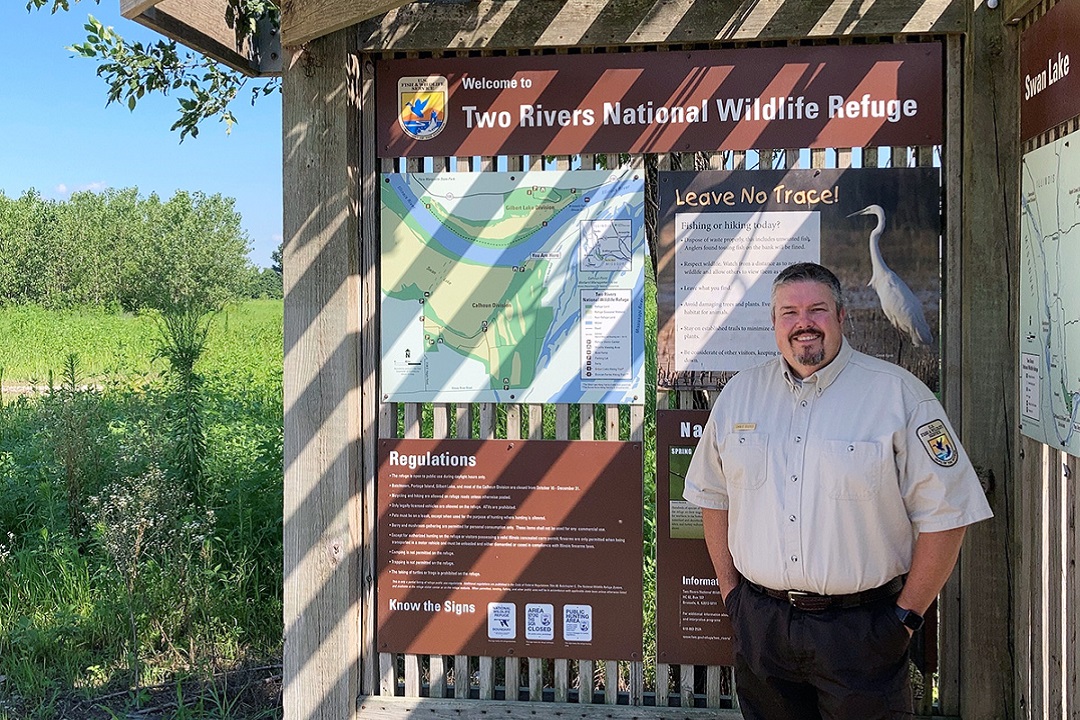When it comes to large rivers, Charlie Deutsch gets i
As many land managers, biologists, maintenance workers, and other front-line field staff know from their own experience, there’s a great amount of value in staying put in one geography over time. Seeing the seasons change over the years, the water levels go up and down, and the river’s path change help define a person’s understanding of that place. Professionally speaking, Charlie has more than three decades of experience working the confluence of these dynamic rivers, but his connection goes even deeper. He was even born and raised in the heart of it in Alton, Illinois.
Most recently working as the supervisory wildlife biologist out of the Army Corps of Engineers Rivers Project Office in West Alton, Missouri, Charlie brings more than 12 years of experience overseeing 155,000 acres of public lands and waters in and around the Mississippi and Illinois rivers. Additionally, he served as the lead for the St. Louis District on the Upper Mississippi River System forest management team that developed system forest stewardship plans, implementation protocols, and monitoring feed into an adaptive management framework for the river system.
“In 2015, Charlie was part of a job swap that allowed him to work with the Fish and Wildlife Service on biology and management activities at Two Rivers, so in addition to being a valued partner of the refuge, Charlie also has first-hand experience that he plans to use in this new role,” noted Refuge Supervisor and Area Manager Sabrina Chandler.
As mentioned earlier, Charlie’s career path along the confluence runs much deeper than his last position with the Corps. It runs back to the early 1990s, when he first got his start as a park ranger student trainee at the Rivers Project Office and even farther into the past from there.
While Charlie has worked with many inspirational folks throughout his career, he notes that his grandfather, Roy Taylor, was probably the one he cherished the most as his conservation hero.
“My grandpa started working for our agency at Chautauqua National Wildlife Refuge in 1950, after serving in World War II. He was hired as a general maintenance man and often worked with Frank Bellrose of the Illinois Natural History Survey, banding and monitoring wood ducks and other waterfowl,” said Charlie.
You could say that Charlie’s real start with the National Wildlife Refuge System was back during those formative years. He even got to shadow his grandfather, some years later after Roy transferred to Crab Orchard National Wildlife Refuge.
When Charlie was a teenager, h
One of Charlie’s greatest mentors was his high school field ecology teacher, Marvin Mondy, who remains a close family friend and lifelong mentor.
“He really opened my eyes to the study of ecology and conservation and introduced me to Aldo Leopold with a copy of Sand County Almanac, which is still one of my favorite books,” said Charlie.
Lastly, what makes Charlie so well-suited for his new role at the refuge is the real satisfaction and joy that he derives from helping to connect people with their public lands and waters and unpacking the biological and hydrological reasons why refuge staff manage the landscape. Charlies says that moment when he sees someone move from a quizzical look to an “ah ha” moment makes him proud to be a public servant in the conservation field.


Leave A Comment